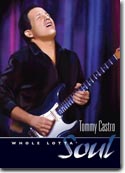 During the second half of the ’90s, Tommy Castro
helped develop today’s contemporary blues. He grew up in San Jose and
became enthralled with the blues after realizing it influenced Eric
Clapton and Mike Bloomfield. Castro sings charismatically, plays wailing
guitar, and writes forceful rock ‘n’ soul numbers. Randy McDonald
(bass), Keith Crossan (sax), and Tommy have been performing and
recording together for 14 years. Chris Sandoval (drums) is the newest
band member.
During the second half of the ’90s, Tommy Castro
helped develop today’s contemporary blues. He grew up in San Jose and
became enthralled with the blues after realizing it influenced Eric
Clapton and Mike Bloomfield. Castro sings charismatically, plays wailing
guitar, and writes forceful rock ‘n’ soul numbers. Randy McDonald
(bass), Keith Crossan (sax), and Tommy have been performing and
recording together for 14 years. Chris Sandoval (drums) is the newest
band member.
Like Blind Pig’s other recent live DVDs, Whole
Lotta' Soul was also recorded at the Sierra Nevada Brewery “Big
Room” in Chico, California in 2005. The 350-seat venue is where the PBS
TV series Sierra Center Stage is recorded, has excellent
acoustics, and has been called one of the best live music spaces on the
West Coast. This professionally produced DVD was filmed in wide-screen,
and features camera angles from seven different operators. Of course,
Castro appears dressed in black and plays his well-worn Stratocaster.
Although he is constantly smiling, he doesn’t possess a spellbinding
stage presence. In between songs, there isn’t much interaction with the
crowd. Castro communicates via his powered music, which keeps the dance
floor packed.
The riveting 11-song set includes nine songs from
Soul Shaker (which spent 19 weeks on the Billboard blues
chart), Castro’s most recent and best Blind Pig CD. The only songs that
do not appear on Soul Shaker are "You Only Go Around Once" and
"Texas Flower." The latter, which sounds like it came from an Elvis
Presley movie soundtrack, appeared on McDonald’s solo CD and is the only
track not written by Castro. The song exhibits rocking piano and guitar
solos, as well as the very intense and animated McDonald.
Interviews with Castro and his band add 16 minutes
to the hour long concert. Kevin Bowe adds guitar to several numbers,
while sultry red-headed Renee Austin provides jostled backing vocals on
"Let’s Give Love A Try." Tom Poole’s assertive trumpet and Jimmy Pugh’s
bold organ can be heard on practically every Castro CD. These choice
musicians guest on many songs here – including the lovely "Anytime Soon,"
which contains hopes and dreams for a better world. Shivers will run
down your spine when you hear the lyrics. "The Next Right Thing" is
sleek, chic, and loaded with funk. It features a great arrangement that
travels from mellow to heavy. During "Take Me Off The Road," Castro is
self-reflecting and soul-searching, while McDonald launches into a wild
trucker’s CB radio rap. "What You Gonna’ Do Now?" is thought-provoking
and expresses questions which many of us cannot or will not address. At
times, Crossan blows his sax as deep as a Great Lakes freight ship’s
horn. Throughout, he injects a rock ‘n’ roll feel ala the Silver Bullet
Band.
Castro is a real inimitable string-bender. As
proof, just watch and listen to "No One Left To Lie To." Time and time
again, the ghost of Otis Redding can be heard in Castro’s vocals that
moan, shout, scream, and hum. In a different era, Castro would have been
the ruler of FM radio. For the present, he is without a doubt, the king
of rock ‘n’ soul.
--- Tim Holek
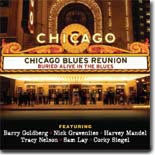 Buried Alive In The Blues (Out The Box) is a celebration of the first generation of
white musicians who openly embraced the blues. They were accepted and
included to the point of performing with their black heroes and
establishing the first integrated blues band. The generation is now
approaching or has already entered their senior years. Like your
favorite grandparents, they have a valuable history that deserves to be
told and heard. Chicago Blues Reunion’s members have led interconnected
professional lives for the past five decades. Nick Gravenites
(vocals/guitar) wrote "Buried Alive In The Blues" for Janis Joplin and
"Born In Chicago," the signature song of The Paul Butterfield Blues Band
featuring Sam Lay (vocals/drums). Butterfield’s guitarist, Mike
Bloomfield, later joined The Electric Flag, which included Barry Goldberg
(keyboards) and Gravenites. Tracy Nelson (vocals) was a fixture on
Chicago’s 1960s folk and blues scenes before she founded Mother Earth.
Harvey Mandel (guitar), a Bloomfield protégé, was part of Canned Heat
and John Mayall’s Bluesbreakers. Corky Siegel (harmonica/vocals) has
been a Chicago fixture from his years with Siegel-Schwall. Joining them
are Gary Mallabar (drums), Rick Reed (bass), and Zach Wagner (guitar).
Buried Alive In The Blues (Out The Box) is a celebration of the first generation of
white musicians who openly embraced the blues. They were accepted and
included to the point of performing with their black heroes and
establishing the first integrated blues band. The generation is now
approaching or has already entered their senior years. Like your
favorite grandparents, they have a valuable history that deserves to be
told and heard. Chicago Blues Reunion’s members have led interconnected
professional lives for the past five decades. Nick Gravenites
(vocals/guitar) wrote "Buried Alive In The Blues" for Janis Joplin and
"Born In Chicago," the signature song of The Paul Butterfield Blues Band
featuring Sam Lay (vocals/drums). Butterfield’s guitarist, Mike
Bloomfield, later joined The Electric Flag, which included Barry Goldberg
(keyboards) and Gravenites. Tracy Nelson (vocals) was a fixture on
Chicago’s 1960s folk and blues scenes before she founded Mother Earth.
Harvey Mandel (guitar), a Bloomfield protégé, was part of Canned Heat
and John Mayall’s Bluesbreakers. Corky Siegel (harmonica/vocals) has
been a Chicago fixture from his years with Siegel-Schwall. Joining them
are Gary Mallabar (drums), Rick Reed (bass), and Zach Wagner (guitar).
Appearing aged and not well-preserved, Gravenites states, “We have a
history,” while the youthful looking, gray-haired Siegel adds, “We are
part of each other’s lives.” In a nutshell, they took black blues out of
the black Chicago clubs and introduced it to the world beginning in the
city’s north side. This stylishly packaged DVD/CD combo includes a
bountiful 32-page booklet loaded with archival photos. The 80-minute DVD
presents six live performances (these plus eight more are included on
the hour-long CD), but it also exposes interviews with band members and
Buddy Guy, as well as archival video, and a photo gallery with many
never before seen photographs. Especially cherishing is the footage of
Electric Flag at Newport and film clips from an early ’70s Soundstage
PBS TV show featuring Muddy Waters, Jr. Wells, and Gravenites. The
praise-filled interviews have been visually edited to have a retro look.
Overall, the DVD unfolds like a well-written special feature in your
favorite blues magazine.
Recorded in stereo on October 15, 2004 at FitzGerald’s in Berwyn,
Illinois, Gravenites performs while seated throughout. On "Born In
Chicago" Mandel’s guitar screeches as it is yanked in the background. The
title track contains a relaxed groove that is welcoming and familiar. At
times, as on this song, the tiny stage makes it a challenge for the
camera operators to maintain a non-obstructed view. "Walk Away" exhibits
the warbling vibrato vocals of Nelson. During the song, you can tell
Siegel loves the performance. This image echoes his interview
exclamation, “We love the blues.” The deepest blues emerges on "Left
Handed Soul." Here, the electric piano is audacious, while the organ is
haunting. The keyboards punch out and make Slim Harpo’s "Miss You Like
The Devil" a rockin' shuffle while Nelson’s vocals command enthusiasm.
"Drinkin’ Wine" is an outright fun song that jumps and rocks at the same
time. Delbert McClinton’s "I Need All The Help I Can Get" contains the
best rhythm and a dose of funk. "Death Of Muddy Waters" is traditional
electric blues performed in honor of its ultimate purveyor. Mandel’s
wicked guitar is showcased on "Snake," while Lay kicks out incomparable
vocals on a medley of classic rock ‘n’ roll. Additionally, you’ll hear
boogie rock and psychedelic blues-rock.
Gravenites’ vocals aren’t strong; Mandel’s heavy guitar is outlandish,
while Goldberg’s keys are scintillating. The title of the virtuous group
is a bit misleading, since Muddy Waters, Howlin’ Wolf, Lil’ Ed, and Carl
Weathersby are golden era and modern day artists that come to mind when
you think of Chicago Blues. It is doubtful the artists who comprise this
super group would land near the top of an exhaustive Chicago Blues
listing. The fact remains --- they were actively part of the Chicago Blues
scene and were mentored by its golden era prophets. After watching the
DVD, you walk away with nothing but respect and admiration for these
artists. They achieved what no one had done before them and, thankfully,
some of them have persevered so a new generation can enjoy them and hear
their worthy story.
--- Tim Holek
The Montreux Jazz Festival began in 1967. Today, it is one of the
world’s most prestigious music festivals. Eagle Vision’s Live at Montreux DVD series features concert footage from some of the best
Montreux performances. Legends featuring Eric Clapton bring together five significant musicians
for a special concert. All the artists are equally talented and revered
within their individual genres and the music industry as a whole. The
unassuming band includes respected jazz drummer Steve Gadd, coveted
multi-instrumentalist Marcus Miller on bass, Crusaders founding member
Joe Sample on piano, prominent saxophonist David Sanborn, and legendary
Eric Clapton on guitar and vocals. Miller was the nucleus of Legends,
who he put together specifically for an 11-date tour of major European
jazz festivals. Clapton is one of rock’s most prolific artists. If he
isn’t recording or touring as a solo act, he is taking part in a side
act. Lately this has spurred a plethora of DVD releases such as Cream
Royal Albert Hall May 2005, The Concert For Bangladesh, and
Sessions For
Robert J. Live At Montreux 1997 is one of the most interesting because
it is extremely different from all of Clapton’s other work. Dressed in
cargo pants, a bowling shirt, and sporting black rim glasses, he appears
relaxed and more aligned with today’s fashions than those on the late
’90s.
Recorded on the Fourth of July, 1997, ironically Clapton is the only
non-American of the group. That same year he also went incognito when
appearing as X-Sample on the TDF CD. "Full House" features stunning solos
from everyone except Gadd (who doesn’t perform a solo); Sanborn’s solo is
the most breathtaking. Viewers are left pondering how a skinny guy can
make so much noise from his wind instrument. The electric piano on "Groovin’" brings back memories of Herbie Hancock LPs.
"Ruthie" is powerful.
The grand piano sounds charming, and when combined with the arresting
melody on guitar takes you away to a distant and tranquil land. Looking
for dignified and mesmerizing saxophone and guitar? Check out "Snakes"
(the definite highlight of the DVD), where all band members receive a
solo. "The Peeper" is another highlight. Here, Sanborn erupts via a
wailing solo while the guitar and piano solos are classically
astounding. During the introduction of "Going Down Slow," EC makes a
mistake and laughs it off. The sax adds genuine rank over the studio
recording, which appeared on Clapton’s Pilgrim. All five musicians
evenly contribute as band members. There is no single superstar in this
super group. However, on two occasions, two of the members clearly enjoy
the spotlight. "Third Degree" is pure blues and is Clapton’s chance to
shine. Likewise, Joe Sample momentarily steals the show on Jelly Roll
Morton’s "Shreveport Stomp."
If I was forced to classify this genre-blending act, I’d have to
consider them as jazz. As with any reputable jazz act, there are lots of
instrumentals, improvisations, solos, yet the group performs as if they
have been together for years. The DVD contains no special features, but
the 12 camera operators create an enjoyable view and the audio is
available in a 5.1 mix.
--- Tim Holek
 To say the year 2005 was a rough one for Jeff Chaz would be an
understatement. The New Orleans guitarist evacuated the Crescent City
for Florida prior to Hurricane Katrina’s arrival, but like most
residents there, was unable to return home for months. Chaz spent
several months after the hurricane battling depression and wondering
what he was going to do next, and whether he was even going to return to
New Orleans or just start from scratch somewhere else. After months of
soul-searching, Chaz returned to New Orleans (after all, he is known as
“The Bourbon Street Bluesman”) and has released his newest CD, In Exile,
on his own JCP label.
To say the year 2005 was a rough one for Jeff Chaz would be an
understatement. The New Orleans guitarist evacuated the Crescent City
for Florida prior to Hurricane Katrina’s arrival, but like most
residents there, was unable to return home for months. Chaz spent
several months after the hurricane battling depression and wondering
what he was going to do next, and whether he was even going to return to
New Orleans or just start from scratch somewhere else. After months of
soul-searching, Chaz returned to New Orleans (after all, he is known as
“The Bourbon Street Bluesman”) and has released his newest CD, In Exile,
on his own JCP label.
This CD was in the can, so to speak, prior to the
hurricane, and it features more of Chaz’s tough high-energy blues. The
production has more of a “live in the studio” feel to it than his
previous releases, but it works just fine. It’s hard to say what Chaz’s
strong suit is, musically speaking, because he’s strong in several
different areas. On guitar, he’s first-rate, and his diverse skills are
on display on several instrumentals, including “Brownin’ The Flour,”
“Gumbo Roux,” and “The Shuffle in ‘C’.”
Chaz is also an excellent
singer, with plenty of emotion and grit to his voice, and he is hitting
his stride as a composer as well, with some of the most imaginative
themes and lyrics you’ve heard in a while. He can tackle familiar blues
themes, like “Hello Blues,” “You Don’t Know What Love Is,” and “I’m Sick
& Tired (Of Being Broke All The Time),” and give them a fresh face.
“Dreams Don’t Lie” is a deep soul number, with one of Chaz’s best vocal
efforts. He also displays a playful nature in his songs, with tracks
like “New Car Smell,” “Drunk & Stoned,” “You’re Wearing Out Your
Welcome,” and “I Smell Something Funky.”
Like most musicians in New
Orleans, Chaz is slowly beginning to get some work again as tourists
begin trickling back to the Crescent City, but right now there are a lot
of musicians out there competing for a limited number of gigs.
Hopefully, In Exile will enable Jeff Chaz to regain some momentum and
get back on his feet. Blues fans of all kinds, especially those who love
blues guitar, will find a lot to enjoy about this disc. While you’re
surfing around, visit Chaz’s website (www.jeffchaz.com) for biographical
and booking information.
--- Graham Clarke
Bill Homans, a.k.a. Watermelon Slim, has an interesting past. He learned
to play left-handed, backward slide guitar while laid up in an Army
hospital in Vietnam, using a $5 guitar and a Zippo lighter as the slide.
He recorded an album in the ’70s, did some watermelon farming, academic
work (a masters degree in history), and truck driving (hauling
industrial wastes) during the ’80s and ’90s. Slim also played with
artists like Henry Vestine of Canned Heat, “Earring” George Mayweather,
Bonnie Raitt, Robert Cray, John Lee Hooker, and did a stint in Paris
with Champion Jack Dupree, where he nearly died from a heart
attack. The heart attack gave him a new outlook on what he wanted to do
with his life, leading him to leave his truck driving job and recording
a couple of albums, including 2003’s Up Close & Personal, which helped
earn him a Handy nomination.
Now in his mid-50s, Watermelon Slim is
performing like there’s no tomorrow and stands poised to reap some
long-awaited benefits, especially from his latest release on NorthernBlues
Music, Watermelon Slim & The Workers. Teamed with a potent
band (Michael Newberry – drums & percussion, Ike Lamb – guitars, Cliff
Belcher – bass), Slim’s powerful brand of blues, like Slim himself, is
as authentic as the gumbo mud of the Mississippi Delta. The opening cut,
“Hard Times,” by all rights, should become a new blues standard, but
really most of the songs could fill that slot as well, like “Check
Writing Woman,” “Bad Sinner,” and “Juke Joint Woman.” “Frisco Line” has
a Mississippi Fred McDowell/RL Burnside edge to it.
More fresh sounds
come from tracks like “Devil’s Cadillac,” “Mack Truck,” and “Folding
Money Blues.” The closer, “Eau De Boue,” sung in French, is a poignantly
autobiographical song about why Slim continues, and will continue to
play the blues as if his life depends on it. Slim plays slide guitar,
dobro, harmonica, and his fervent vocals give all his lyrics a personal
edge.
Quite simply, Watermelon Slim’s blues are unlike any you’ve heard
in a long time. If you’re a blues fan, you really need to check this one
out.
--- Graham Clarke
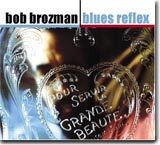 Bob Brozman has been regarded as one of the best blues guitarists around
for many years, but he has branched out over the years to other styles
and genres, including Hawaiian music, African music, and ska. His latest
effort from Ruf Records, Blues Reflex, is the best of several worlds, as Brozman puts a new twist on several of his favorite pre-war selections,
playing them in different styles, giving them a complete makeover in
most cases.
Bob Brozman has been regarded as one of the best blues guitarists around
for many years, but he has branched out over the years to other styles
and genres, including Hawaiian music, African music, and ska. His latest
effort from Ruf Records, Blues Reflex, is the best of several worlds, as Brozman puts a new twist on several of his favorite pre-war selections,
playing them in different styles, giving them a complete makeover in
most cases.
Of the 13 tracks, nine are Brozman originals, and they
include some of the real standouts, such as the opener, “Dead Cat On The
Line.” Beginning with a recording of a 1929 sermon by the Reverend J. M.
Gates, the song turns into an incredible journey with Brozman playing a
National Baritone Tricone guitar, a Bear Creek Kona Hawaiian guitar,
Chinese temple blocks, and several other instruments.
The other standout
is a remake of a song Brozman recorded over two decades ago. The 1920’s
classic, “One Steady Roll” is revamped by Brozman on two Tricone guitars
in sega rhythm, and is a heart-racing thrill to the ears. Other
highlights on this stunning release include “Death Come Creepin’,” which
sounds like a Tommy Johnson original, though it was written by Brozman.
“Mean World Blues” also revisits Johnson’s distinctive sound with
satisfying results. Brozman also pays tribute to Charley Patton with
loose interpretations of two of the Delta legend’s standards,
“Rattlesnake Blues” and “Poor Me.”
Other highlights include “Vieux Kanyar Blues,” a fast-paced instrumental with Brozman playing two Kona
Hawaiian guitars, “Little Tough Guy Blues,” another Brozman original on
Hawaiian guitar that sounds like it sprang straight from the Mississippi
Delta, and “It’s Mercy We Need,” a mournful instrumental that Brozman
describes as “a protest song without words.”
Bob Brozman’s catalog has
always made for interesting listening, but Blues Reflex may be his most
diverse set yet and should be required listening for fans of acoustic
guitar.
--- Graham Clarke
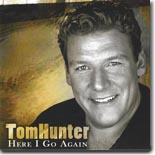 Over the past 15 years, keyboard man Tom Hunter has played with or
appeared on recordings by Bill Perry, George Davis, Murali Coryell,
Little Sammy Davis, Big John Dickerson, and Bernard Allison. Hunter’s
third solo release, Here I Go Again (FS Music), is a lively disc that
mixes blues, pop, jazz, and soul standards with a couple of Hunter
originals. Hunter is a talented musician, playing piano, Fender Rhodes,
and Hammond Organ, and is a robust singer, able to tackle any of the
genres he chooses.
Over the past 15 years, keyboard man Tom Hunter has played with or
appeared on recordings by Bill Perry, George Davis, Murali Coryell,
Little Sammy Davis, Big John Dickerson, and Bernard Allison. Hunter’s
third solo release, Here I Go Again (FS Music), is a lively disc that
mixes blues, pop, jazz, and soul standards with a couple of Hunter
originals. Hunter is a talented musician, playing piano, Fender Rhodes,
and Hammond Organ, and is a robust singer, able to tackle any of the
genres he chooses.
Any song list that includes three covers of Doc Pomus
tunes has to be a strong one. Hunter selected wisely from that catalog
and shows a real gift for interpreting these songs (“I Underestimated
You,” “Imitation of Love,” and “The Night Is A Hunter”). Hopefully, he
will cover more Pomus tunes in future releases. Other solid selections
include Tom Waits’ “New Coat of Paint,” Ray Charles’ “Drown In My Own
Tears,” Spencer Williams’ classic “Basin Street Blues,” and Billy Joel’s
“New York State of Mind.” Hunter also takes an interesting stab at Sonny
Rollins’ “Tenor Madness.”
Two original compositions by Hunter, the title
cut and “Nothing’s For Free,” stand up well with the standards. The band
provides exemplary backing, particularly Jon “Gunnar” Gunvaldson’s jazzy
guitar work.
There just aren’t enough blues albums out there these days
featuring the piano as the lead instrument, but Here I Go Again is ready
and able to buck the trend, with some great music covering a broad range
of styles.
--- Graham Clarke
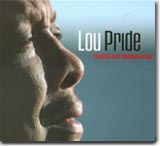 Before I even start this review of Lou Pride's Keep On
Believing (Severn Records), I must comment on the excellent
production found on this release. It is the way all soul CDs should be
done, with real musicians, fabulous background singers, and horns to die
for. The sound is pure Hi or Stax records in their prime, a time prior
to using synthesizers and drum kits, and a sound that works so well with
Pride's classic soul voice.
Before I even start this review of Lou Pride's Keep On
Believing (Severn Records), I must comment on the excellent
production found on this release. It is the way all soul CDs should be
done, with real musicians, fabulous background singers, and horns to die
for. The sound is pure Hi or Stax records in their prime, a time prior
to using synthesizers and drum kits, and a sound that works so well with
Pride's classic soul voice.
This release is his third for Severn, but in the truest sense it is
really only his second of new material, since The Memphis/El Paso
Sessions date back to 1970-73 and his Suemi sides he recorded for
that label. Keep On Believing is a CD with 12 songs penned by
Pride, and one cover, the Bob Marley "Waiting in Vain." One of the Pride
originals is the U.K. dance classic "I'm Com'un Home in The Morn'un,"
re-sung here. There's an interesting story surrounding this song. The
original Suemi was quite rare in it's original 45 issue, and became so
big on the U.K.'s Northern soul scene that originals go for about 1,000
pounds in England (the equivalent of $1700.00 in the United States).
Another Suemi original, "Your Love Is Fading," commands about $1,200, so
it might be time to cash in if you own either of these original 45s.
After listening to the original "I'm Com'un Home" many times on the
Memphis/El Paso Sessions, I felt this newer version lacked the intensity
of the original, but still works well enough in this new setting. A few
of the upbeat tunes, like "I Wanna Be The Man You Want," sort of go
nowhere, as does "Another Broken Heart," and "Layin' Eggs" doesn't get
my sunny side up.
There are those classic ballads such as "I Want To Hold Your Hand"
(Pride, not Lennon-McCartney) that is pure classic Memphis-sounding
soul. " Love Will Make It Alright" is another that scores high, but
overall this release is not quite as strong as 2003's Words Of
Caution. On a scale of 1-5, perhaps a three. Now, seeing Lou Pride
live is a different matter. One of the last great soul performers from
the days when singing and performance really mattered, Pride is a
delight to see and hear, and one of soul music's classiest people. If he
comes to your town, make attending one of his shows a priority.
--- Alan Shutro
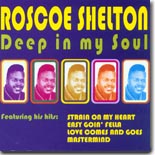 In previous reviews I have discussed the historically important Sound
Stage Seven record label. It's name might not create as much interest
among Southern Soul devotees as Stax or even Goldwax, but true followers
of that genre are sure to have some SS7 records in their collections.
In previous reviews I have discussed the historically important Sound
Stage Seven record label. It's name might not create as much interest
among Southern Soul devotees as Stax or even Goldwax, but true followers
of that genre are sure to have some SS7 records in their collections.
Sound Stage Seven started in 1961 as a subsidiary of Monument Records
and continued to release record until 1977, a year after Stax went belly
up and disco music was becoming a musical force to be reckoned with. SS7
was owned and operated by John Richbourg, who was one of the most
influential DJs in the world. He broadcast out of WLAC in Nashville, one
of the nation's highest wattage AM radio stations. With such great
artists as Joe Simon, Ann Sexton, Sam Baker, Geater Davis, Fenton
Robinson and of course the two artists featured this month, Roscoe
Shelton and Earl Gaines, SS7 had a roster to rival the major labels.
With Richbourg and another great DJ Hoss Allen promoting the records on
the air, many hits flowed through their doors. Their signal was strong
enough to be heard as far west as Texas and as far north as New York but
of course their real strength remained in the deep south.
Roscoe Shelton was one of the most prolific artists on the label. His
career started back in the late '50s with Excello Records and peaked
in the mid '60s on SS7. He continued to record up until his death in
July of 2002, with releases on several labels including one on the now
defunct Black Top label.
Deep In My Soul (AIM - Australia) contains 27 tracks of pure deep southern soul, with such classic
songs such as "Strain On My Heart," which peaked at #25 on the Billboard
R&B charts in 1965, and "Easy Goin' Fella," which peaked at #32 in 1966.
It is with great hope that reissues like this will allow new generations
to discover these important pioneers of early soul music.
--- Alan Shutro
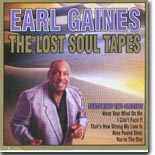 Earl Gaines' career is even a bit more diverse than Roscoe Shelton's.
Starting a few years earlier, Earl got his big break in 1955 singing
lead on The Louis Brooks and the Hi-Toppers record of "It's Love Baby
(24 Hours A Day" on Excello. Brooks and his group were reluctant to tour
and leave behind their lucrative studio and nightclub work, so the next
two singles were released under Earl's name. Earl went out on the road
usually with package tours, but also sang lead with the very popular Bill
Doggett's group. The Excello records didn't chart and Excello did not
renew his contract. He recorded a few singles for the Champion label in
the late '50s with enough success to keep him on the road. In 1964 Earl
turned his career over to the aforementioned Bill "Hoss" Allen, the
legendary WLAC disc jockey. Featured on Allen's television show, "THE
BEAT," on several occasions gave Gaines the needed exposure and his
career was on its way.
Earl Gaines' career is even a bit more diverse than Roscoe Shelton's.
Starting a few years earlier, Earl got his big break in 1955 singing
lead on The Louis Brooks and the Hi-Toppers record of "It's Love Baby
(24 Hours A Day" on Excello. Brooks and his group were reluctant to tour
and leave behind their lucrative studio and nightclub work, so the next
two singles were released under Earl's name. Earl went out on the road
usually with package tours, but also sang lead with the very popular Bill
Doggett's group. The Excello records didn't chart and Excello did not
renew his contract. He recorded a few singles for the Champion label in
the late '50s with enough success to keep him on the road. In 1964 Earl
turned his career over to the aforementioned Bill "Hoss" Allen, the
legendary WLAC disc jockey. Featured on Allen's television show, "THE
BEAT," on several occasions gave Gaines the needed exposure and his
career was on its way.
A single, "The Best of Luck To You," was licensed to the HBR (Hanna-Barbera)
label and it peaked at #28 on the R&B charts. In 1966 a full album
titled the same as the single was released, and it has become a deep
soul classic.
In 1967 Hoss Allen took many of his artists to the King-Deluxe label.
Earl had some strong selling singles for them which ultimately spawned
another great album, Lovin' Blues, in 1972. With Allen's health
problems interfering with his business, he enlisted another WLAC DJ,
John Richbourg, to be Gaines' new manager. Earl recorded five singles for
Seventy-Seven between 1972-1974, having a chart hit with The Mighty
Hannibal's "Hymn #5."
Richbourg closed his labels in 1975 and Gaines was on his own once
again.
From 1975-1995 Earl worked as a long haul cross country driver and
performed sporadically until the late '80s. His comeback really took
hold as part of the "Excello Legends" tour along with Roscoe Shelton and
Clifford Curry. The long and winding road also led him to the Black Top
label where he recorded an excellent album before they folded.
It is his
output for Sound Stage 7 that is featured on The Lost Soul Tapes
(AIM - Australia), 20 great tracks of
burning southern soul blues. He still performs today around his hometown
of Nashville, and one of my regrets is that I never got to see the
Gaines/Shelton tour.
This release is a must have, as is the King-Deluxe material that was
released in England a few years ago. There's also a fine album produced
by the great Fred James on the Appaloosa album that is well worth
seeking out.
Another great release on the Black Magic label out of the Netherlands,
24 Hours A Day, features the great Hanna-Barbera sides and was reviewed
in the March 1999 Blues Bytes issue by editor Bill Mitchell. You be glad
you picked up any of these releases, as they are all classics from the
Golden Age of soul music.
--- Alan Shutro
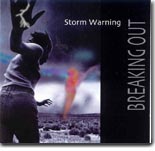 I have to admit to not having heard of Storm Warning before, but it’s a
good band and I’m sure I’ll be hearing more of them. Breaking Out is the debut album from the band, which has been together for just
over a year, but which sounds as though it is very well established.
The band members certainly have plenty of experience between them, as
well as heaps of musical ability.
Front man Son Maxwell (vocals & harmonica) is the author of a couple of
books on harmonica playing, and cites Sonny Boy Williamson II as a major
influence.
Drummer Roger Willis has played on albums by Lynyrd Skynyrd, Linda
Lewis, Tony Ashton and Jon Lord, as well as playing in support bands for
major acts on tour.
They are joined by Bob Moore on guitar, Derek White (bass) and Ian
Salisbury playing piano & keyboards.
I have to admit to not having heard of Storm Warning before, but it’s a
good band and I’m sure I’ll be hearing more of them. Breaking Out is the debut album from the band, which has been together for just
over a year, but which sounds as though it is very well established.
The band members certainly have plenty of experience between them, as
well as heaps of musical ability.
Front man Son Maxwell (vocals & harmonica) is the author of a couple of
books on harmonica playing, and cites Sonny Boy Williamson II as a major
influence.
Drummer Roger Willis has played on albums by Lynyrd Skynyrd, Linda
Lewis, Tony Ashton and Jon Lord, as well as playing in support bands for
major acts on tour.
They are joined by Bob Moore on guitar, Derek White (bass) and Ian
Salisbury playing piano & keyboards.
Breaking Out features nine tracks altogether, most of which are written
by the band – the exceptions being Keb Mo’s “Dangerous Mood” and Peter
Green’s “Long Grey Mare,” which the early Fleetwood Mac played with such
verve.
These two covers are played to perfection, slightly changed from the
original rather than just exact copies – it always a good thing for a
band, or musician, to put their own stamp on a cover of someone else’s
song.
“Dangerous Mood” has almost a big band feel to it, there is so much
going on in this track – I’m sure that Keb Mo would approve heartily.
The approach to “Long Gray Mare” is more simplistic, the harp of Stuart
Maxwell getting a good outing at the front of the rhythm section, and
sounding good.
The band’s original tracks are a good mix of slow and up-tempo numbers,
possibly with a slight emphasis on the slow, and there isn’t a bad track
amongst them.
The first two tracks are good, solid blues that open the album in good
style.
Track six, “Ballad Of ‘64,” is a good rocking blues looking back at life in
the '60s, with some very inspired lyrics – a “foot-tapper.”
The following track, “Upton Strut,” brings out some nice Hammond sounds
from the keyboards of Ian Salisbury, combining nicely with Maxwell’s
harp, on this instrumental funky blues.
I’m left pondering which of the next two tracks qualifies as my
favourite – the driving “The Blues Are Back” or the slow and moody
“Whisky Blues.”
It’s difficult to choose between the two, even though they are so
different in their execution – so I’ll have to have two favourites!
We’ll be hearing a lot more from this band, they deserve to be listened
to!!
Have a look at their website –
www.stormwarning.co.uk.
--- Terry Clear
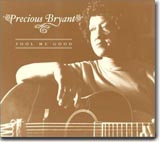 Fool Me Good (Terminus Records) is the first CD released by Precious
Bryant, a Piedmont guitarist/singer from Georgia who was recorded by
folklorist George Mitchell in the late '60s. Precious Bryant also had
some songs on various artist compilations put out by the Music Maker
Relief Foundation. She shows off her tremendous skills through four
covers, five traditional songs and six originals.
Fool Me Good (Terminus Records) is the first CD released by Precious
Bryant, a Piedmont guitarist/singer from Georgia who was recorded by
folklorist George Mitchell in the late '60s. Precious Bryant also had
some songs on various artist compilations put out by the Music Maker
Relief Foundation. She shows off her tremendous skills through four
covers, five traditional songs and six originals.
The CD starts off with
a rolling cover of fellow Georgia bluesman Blind Willie McTell's "Broke
and Ain't Got a Dime" that shows off Precious's great guitar work.
"Black Rat Swing" gives Precious the chance to again show off her guitar
playing with a swinging rhythm. One of the highlights of the disc is
"Fool Me Good," with Precious declaring her love for her partner, and
her pleading for her partner to "fool me good" if he doesn't have the
same feelings. "Fool Me Good" is pushed along by a great vocal
performance and a rolling guitar pattern that accentuates the emotion of
the song.
"Precious Staggering Blues" throws some country stylings into
her playing along with the amusing story of the song. Another highlight
of the disc comes from the cover of Oliver Sain's "Don't Mess Up a Good
Thing," with its jumping, staggered guitar pattern and a soaring vocal
performance. "Wadn't I Scared" and her cover of "Fever" are two of the
best performances on this disk. Her version of "Fever" should not be
missed, with a very relaxed, laid back, down home reading of the oft
covered song that she truly turns into her own.
The disc ends with two
very good tracks, a very unique version of "When The Saint's Go Marching
In" that is absolutely stunning to hear and a chance for Precious to
display her tremendous talent on guitar with "Georgia Buck."
This CD is
one of the most enjoyable and original releases, and is a rarity to
find. It should not be missed. One of the most stunning performances to
be released in a long time, this CD should be cherished by the listener.
--- Terry Clear
Precious Bryant’s follow up to her superb debut album, Fool Me Good,
moves on from pure country blues and mixes that genre with some electric
blues and some R&B. The Truth (Terminus Records) is a mix of songs that include influences from songs heard in
her family environment.
Some of the songs here are covers of old numbers that she heard on the
radio and learned,while others are written by Precious Bryant, but strongly
influenced by what she heard years ago.
Her son Tony plays bass on the album, along with J.D.Mark on drums.
Jake Fussel plays guitar on two of the tracks (“Morning Train” and “The
Truth”) and Amos Harvey takes over the bass for “Sit Down Servant.”
Fool Me Good was a hard act to follow, and Precious has chosen to move
on, rather than just produce a volume two of the same style. She
certainly succeeds, because this is compulsive listening for anyone that
likes their blues traditional and uncomplicated.
The title track, “The Truth,” occupies the number four spot on the CD, and
it’s a gentle, introspective, ballad that is very relaxing to listen to
– the sort of thing that an old musician would play sitting on the front
porch on a summer’s evening.
From the opening track, a superb rendition of the traditional “Morning
Train” to the closing track “Good Night” there is a fantastic mix of
tempos, styles, and genres – Precious Bryant has the talent to switch
from ballad to rocking blues, to country blues and back again.
There are some really good “foot-tappers” here, something which always
sets a standard for my listening --- “Sit Down Servant,” “Tennessee Song”
and Willie Dixon’s “My Babe” being but three of them.
If you want pure traditional blues, played the way it should be, then
listen to “You Can Have My Husband,” but my favourite is Denise
LaSalle’s “Don’t Jump My Pony.”
Precious Bryant’s guitar playing is shown to good effect throughout the
album, as is her skill at adapting songs to her own style and giving
them a slightly different flavour.
This CD makes a great addition to any blues collection.
--- Terry Clear
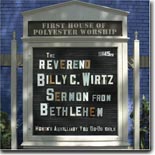 Just got back from Memphis, where the Reverend Billy C. Wirtz served as
the master of ceremonies for the 2006 International Blues Challenge, so
it seemed only fitting that the first CD into my player for review was
Billy’s Blind Pig release, Sermon From Bethlehem. Recorded live at
Godfrey Daniels in Bethlehem, Pennsylvania, the project was also filmed
for DVD, and what a wild night it had to be.
Just got back from Memphis, where the Reverend Billy C. Wirtz served as
the master of ceremonies for the 2006 International Blues Challenge, so
it seemed only fitting that the first CD into my player for review was
Billy’s Blind Pig release, Sermon From Bethlehem. Recorded live at
Godfrey Daniels in Bethlehem, Pennsylvania, the project was also filmed
for DVD, and what a wild night it had to be.
For those of you who have never attended the First House of Polyester
Worship, this disc will definitely introduce you to the inanely
brilliant ramblings of a very talented artist. After his introduction
Billy jumps right in with “Rockin with the Rev,” a short-take on his
qualifications for directorship of the First House, and segues right into
“Sleeper Hold on Satan,” comparing the taming of Satan to a wrestling
match, intoning his mother’s description of life as “a wrestling match
with no disqualification” and a continuing fight against the devils
unleashed by Satan in a championship match. Fortunately for Billy, Jesus
is his tag team partner and ultimately he prevails against Satan and his
sinful temptations.
“Cousin Cupcakes Got the Blues” is a sorrowful lament of the fate that
is his life. The kids are grown up, the wife’s left….all that remains is
the blues. “Do the Toleration” is Billy’s answer to the problems of the
world….if we can’t all get along at least let’s all tolerate each other.
The end result will be less prejudice in the world and even in his next
life the Reverend will be tolerant of Tom DeLay, a reoccurring foil in
this recording.
The wonderful instrumental “Jerry Rig” leads into Billy’s discourse on
his love life, cleverly named, “Female Problems,” and boy does Billy
have them. From a doctor to a contortionist to a landscape surveyor to
bait shop operator to everyone else, Billy has indeed experienced his
share of setbacks. Decorum properly suggest that I don’t delve too much
further into the Reverend’s love life, but when he comments that his
narcoleptic lover gave him the nod….you can pretty much go from there.
“The King & I” finds the good Reverend recounting his experiences with
Elvis, just a couple of regular old guys, “having the time of our
lives.” Billy has been privileged to see the King on several occasions
and one night even followed him home to the trailer he lives in now.
Elvis even offered him a couple of beers while “they waited for the
UFO’s.” It’s probably my favorite song on the CD.
“Grandma vs. the Crusher” brings back fond memories of AWA championship
wrestling. It turns out that on Saturday nights when Billy’s parents
went out, he and his grandma would watch wrestling. The wrestler she loved
to hate was the Crusher, the champion of Milwaukee. It turned out that
she died cussing out the Crusher on Channel 5. Billy fondly remembers
those late nights with his Grandma back in 1963, and all of us who grew
up watching wrestling on Saturday nights can definitely relate.
“Pipeliner Blues” tells the tale of a pipe laying man who laid pipe all
day. He had five kids and was often known to stray…”You never can tell
what a pipeliner man will do…just when you think he’s working he’ll fool
around on you!”
“What I Used To Do All Night” is the common lament of the older man.
“What I used to do all night takes me all night to do!” Things just
never get easier when you get older. “The Visitor” is Billy’s tribute to
Elvis done in the style of Red Sovine. Red is known for his trucker
songs that tell a story and Billy emulates his style to tell the story
of a waitress friend of his who is in the hospital dying. Her one
unfulfilled wish is to see the King before she dies….so Billy arranges
for an Elvis impersonator to fulfill her wish and he shows up the next
day in a huge limousine. Elvis jumps out and goes into his friend’s room
and proceeds to entertain her…in the midst of all of this Billy is paged
and leaves the room to learn that the impersonator was in a car crash
and unable to make it. Upon his return to her room Billy finds a note
from her friend telling him that “thank you very much, Elvis and I have
left the building….thank you very much!”
“Last Date” is wonderful instrumental that segues into Jerry Lee Lewis’s
“Whole Lot of Shaking Going On!” Billy’s playing emulates that of Jerry
Lee’s and is a great closing song to this project. For the uninitiated, I
would strongly recommend the DVD version of “Sermon From Bethlehem.” For
those of us who have witnessed the good Reverend in person, any version
will do. Nobody else does it quite like the Reverend Billy C., and
that’s a good thing.
--- Kyle Deibler
One of the fondest memories I have of taking my father with me to the
Blues Music Awards several years ago is standing behind Gaye Adegbalola
at the bar when she impishly broke into an impromptu song. The beauty of
Ann, Gaye and Andra, those wild uppity blues women we affectionately
know as Saffire, is that you never know exactly what to expect from
them. I’ve turned a number of friends onto Saffire over the years and
it’s fittingly appropriate that Alligator Records has chosen to
celebrate their legacy in the release of it’s newest Deluxe Edition.
All of the great Saffire songs are here. “Middle Aged Blues Boogie” won
a W.C. Handy award (aka Blues Music Award) for song of the year.
“Sloppy Drunk” segues into one of my favorites, “It Takes Mighty Good
Man.” There’s something particularly hurtful to the male species once he
learns that “it takes a mighty good man to be better than no man at
all.” A lesson well learned for all the players out there.
“Ain’t Gonna Hush” is typical Saffire. There’s just no way they are ever
going to be put down or shut up. The wild women of Saffire have blazed a
trail by playing their own music their own way and “Ain’t Gonna Hush” is
their answer to the critics. “Bitch with a Bad Attitude” is just classic
Gaye. It’s a live version that has her discussing the acronym for Bitch.
I beg to differ slightly in the final result --- Bitch actually should
stand for “Beauty In Total Control of Herself,” and with that
understanding I can affectionately call a number of my female friends
bitches and they’ll be pleased. Hopefully Gaye likes my definition as
well.
Andra’s take on “Lightning in These Thunder Thighs” is the first song I
always think of when anyone mentions Saffire to me. In this day and age
of lifetime fitness, her concept of aerobics still appeals….a number of
us would head to her gym anytime. “Tom Cat Blues” and “(No Need) Pissin’
on a Skunk” keep us in our place. Men are dogs, we admit it and Saffire
makes damn sure we know it. That said, “Don’t Treat Your Man like a Dog”
confirms the fact that dogs deserve better treatment than men. Dogs are
loyal, protective and loving. I think we get the hint.
“Because of You” tells us that even the wild women of Saffire have known
great loves. Blessed is the man who has Andra lamenting her feelings.
“T’aint Nobody’s Business” is a wonderful rendition of the Granger &
Robbins song that Ann sings with great passion and supports with
wonderful keyboard work. It’s an understated version of a classic song
that just continues to endure.
Gaye introduces us to the latest creature to exist in blues folklore,
the “Silver Beaver.” Up there beside red rooster and the kingsnake, the
silver beaver proves that it is indeed a new creature that must be dealt
with in the blues world. Nuff said on that topic. “Elevator Man” is
Ann’s latest love and he’s driving her “up, down and out of her mind.”
Obviously a technician who knows what he’s doing. Ann sings wonderful
ballads and “Elevator Man” is just another classic on this wonderful
disc.
More man bashing occurs on “How Can I Say I Miss You.” It’s hard to miss
a bad man when he won’t ever leave. Fortunately when he does you can ysay you don’t miss him. Andra sings great ballads as well, and a
classic example is “In My Girlish Days,” her tale of her misspent youth.
“I didn’t know better, oh boy, in my girlish days.” Andra goes on to
say, “I do know better but I still have my girlish ways.” Good for Her!
Students being what they are, when Ann sings about the “School Teacher’s
Blues,” the only thing to lose is her pay and that “ain’t nothing.”
Teacher’s pay has never been up to the degree of effort required to
educate today’s youth and Ann readily admits that. “Is You Is or Is You Ain’t My Baby” asks the age old question. Are you true to me or not? Men
by nature always stray and here’s hoping that one maybe decided to
change.
Saffire’s Deluxe Edition closes with another wonderful ballad by Andra,
“Falling Back In Love With You,” the irrepressible “Wild Women Don’t
Have the Blues,” and a song I’d not heard before, “The Equalizer.” “The
Equalizer” celebrates the diversity of blues and the fact that it
doesn’t discern between races, religions, sexes or age. Given that
Saffire has bucked every blues tradition along the way, “The Equalizer”
is a fitting song to close out an incredible record.
I’ve always been a huge fan of Saffire. To be able to sit and enjoy
almost 75 minutes of the best of Saffire has been a huge treat. There
aren’t any new songs on this disc but it definitely does contain the
best of three women who in their own way have become a vibrant part of
the blues fabric of our history. Enjoy Saffire, celebrate their
uniqueness and be sure to add the Deluxe Edition to your collection. On
any given rainy day it will serve to move you, uplift your spirits and
make you appreciate the wild woman that exists in your own life.
--- Kyle Deibler
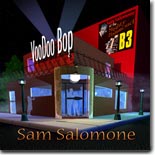 On the Hot Fudge Music label, meet Hammond B3 organist Sam Salomone from
Iowa. Recorded in Des Moines, with the label based in Cedar Falls, this
CD is entitled Voodoo Bop. Voodoo? Yes. Bop? Well it’s not Dizzy’s
bebop nor is it the bop of Buddy Holly. Maybe it’s what track seven
calls “Flip Flop” post-bop!
On the Hot Fudge Music label, meet Hammond B3 organist Sam Salomone from
Iowa. Recorded in Des Moines, with the label based in Cedar Falls, this
CD is entitled Voodoo Bop. Voodoo? Yes. Bop? Well it’s not Dizzy’s
bebop nor is it the bop of Buddy Holly. Maybe it’s what track seven
calls “Flip Flop” post-bop!
This is a 10-piece band that sounds like acid jazz with a horn section
almost the tightness of Tower Of Power, and as if Wilton Felder of the
Crusaders were playing the tenor sax solos (the player here is Don
Jaques). The title track quotes the African hit Soul Makosa, New Orleans
voodoo seeps from the next, Earl King’s well-known “Big Chief.” Most of
the disc could be blues or jazz, moreover the sound of ’60s “soul jazz.”
Wes Montgomery’s “Road Song” is the jazziest of the entries albeit
danceable, a possible concession in the ears of a jazz snob. Conga drum,
so prevalent in similar period music, seems more obvious as the disc
progresses. The alto sax that sets up some riff patterns, plus some
solos, is thin and whiny unlike the richer tenor. 3/4 time is an
occasional device, sometimes doubling effectively to 6/4.
The late great ground-breaking organist Larry Young is represented as
composer on one track, Miles Davis’ “Milestones” is broken down to
“Miles Tones,” and the album concludes with an original “Blood Alley.”
Let’s boogaloo!
Sam started his musical career in the early '60s. First influenced by
Little Richard and Ray Charles, Jerry Lee Lewis was the one to ignite
his passion. He then toured with Del Shannon and The Duprees. It’s
interesting to note that of all these, only traces of perhaps Ray
Charles come across in this album of Salomone’s music. This isn’t his
first recording, but vintage sessions are rare and apparently local to
Iowa, one focusing on works by Lee Morgan and Jack McDuff, and another
featuring the Trenton, New Jersey jazz saxophonist Richie Cole.
Sam bought his first Hammond B3 organ in 1965, then studied theory and
harmony at Grand View College. Making a move to jazz, he traveled from
coast to coast and the Midwest including Chicago and Kansas City, but
has in recent years decided to stay closer to home. He is acknowledged
there, having been inducted to the Iowa Jazz Hall of Fame in 2001 as
well as the Iowa Blues Hall Of Fame. His bio looks more jazz than blues,
but I find this CD right down the middle. Musical grade of B-.
---Tom Coulson
Radio broadcaster/musician
comments to tcoulson@ktar.com
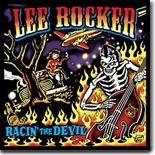 Lee Rocker is known for “muscular slap bass playing” and is most
associated with The Stray Cats over a couple incarnations, but has been
maintaining an impressive solo career since. His Alligator Records debut
is Racin’ The Devil, and follows six other solo albums since ‘94. He is
clearly proudest of this project, having taken a year to do it, and as
producer to boot.
Lee Rocker is known for “muscular slap bass playing” and is most
associated with The Stray Cats over a couple incarnations, but has been
maintaining an impressive solo career since. His Alligator Records debut
is Racin’ The Devil, and follows six other solo albums since ‘94. He is
clearly proudest of this project, having taken a year to do it, and as
producer to boot.
He grew up in Long Island, the son of classical musicians. He started
first on cello, adapting to rock on electric bass, and in high school
with cohorts including Brian Setzer fulfilling a demand for “a
contemporary punk attitude” toward traditional rockabilly, utilizing the
upright bass he had come to specialize in. In 2002, Rocker toured the
U.S. with ex-Elvis Presley guitarist Scotty Moore.
This CD is madness with metal meeting rockabilly and the Dick Dale
guitar sound thrown in (despite no indication that Brophy Dale, one of
the disc’s guitarist and vocalists, is related). And let us not discount
the pioneering Link Wray 'Rumble' attitude. In the remake of the Stray
Cats hit “Rock This Town,” a story is told of using drink change for the
jukebox, only to find techno music, and justified defiance. There’s a
lot of screaming above the energy, yet by “River Runs” the song
structure and lyrical story of the road demands appreciation,
country/folk in root, topped with rich tremelo guitar. This is a sample
of Rocker’s writing and he also plays a third guitar part in places.
Two-step standard rockabilly tempo suffices mid-way thru with Carl
Perkins’ “Say When.” But hold on: At the “Race Track” it’s doubled- and
stepped-up, in pace and scale. The backup singers may as well be the
Jordanaires. But this full sound comes from just four pieces, the other
two being Buzz Campbell's additional guitar and vocal and drummer Jimmy
Sage, the latter apparently overdubbed. “Ramblin’” returns to the CD’s
road theme, while “Running From The Hounds” comes from Rocker’s post-Cats days
with his next group Phantom, Rocker & Slick.
There’s no letting up due to “Rockin’ Harder,” then the next trip stops
at various roadhouses. “Lost On The Highway” is the slowest of
the program, medium tempo at best. (I know, when racin’ the devil, it’s
almost impossible to pull back, but a slow blues would fit just right in
the middle of this disc). We almost end up in the “Funny Car Graveyard,”
but the concluding track features twin lead guitars on a Cat-like
instrumental.
This is evolved rockabilly, after all the original form forbade even a
drummer. Graphics are great and the theme is obvious. If the Cats had
become jaded over time in the opinion of some, Rocker forges demonically
ahead with a form that certainly has blues as a grandparent on one side.
His hard work on, and passion for, this disc is obvious. Musical grade
of B.
---Tom Coulson
Radio broadcaster/musician
comments to tcoulson@ktar.com
From a batch of live Iowa shows, and on the Iowa Hot Fudge label, comes
Summer Souvenir by Bob Dorr And The Blue Band. They’ve obviously been
a fixture in the area for a long time judging by the announcements among
the tracks and the myriad photos in the fold-out CD graphics. Their
appearance looks like a plain old good time, great guys to hang with,
probably pulling a loyal following to most all their partying. Adhering
to an unwritten blues suggestion, “don’t take yourselves too seriously.”
Also among their attributes are a good balance of talented soloists:
tenor sax, organ, guitar, and unlike most new blues product of today,
OCCASIONAL rich harmonica (unless listening to one of the late greats, a
little goes a long way--thank you). The organ bass playing adds a nice
blues touch. The overall production is in good taste.
But among the detractions are forced vocals, and though adequate in
meter, a rather weak collective groove. Take for example the opening
chestnut, “Good Morning Little School Girl.” This has so much more
potential for feeling. The leader/singer matches composer Sonny Boy #
1’s linguistics right down to “...go home witch you.” I doubt he talks
to his mortgage banker this way. If this was the band’s debut disc,
dings like these would practically be understandable. What’s rather
disturbing is it’s the Blue Band’s eighth or ninth disc (including a “best
of” and Christmas collection) so by now they should be hitting note one
of track one absolutely on fire.
The disc fares better as it goes along, group vocals sound like
camaraderie, swing and shuffle-type rhythms are steadied at one point
with drum rim shots, imitating the slap-bass sound of rockabilly.
Multiple horns work well together as a section. For Earl King’s “Big
Chief,” the rhythms suggest their New Orleans source, the vocals and
drumming are warmed up and less mechanical.
There’s also too much announcing. I wish the leader would just sing like
he talks. Leader Dorr has experience as a radio host and even has a CD
release exclusively of his interviews with blues greats. Here, patter is
probably part of stage presence, involving the audience part of the
show, which is well-intended. But it doesn’t transfer well to strictly
audio. The inclusion of the home video of “Elvis In Paraguay” is
different, but sometimes novelty turns silly. This is probably a
performance the public would, or does, love.
I stayed with the disc, expecting to hear “Mustang Sally” and “Stormy
Monday” around the bend. Instead Kevin B. F. Burt did a grabbing
midrange vocal workout on the funky closer “Don’t Treat Your Good
Thing.” Overall CD musical grade of C-.
---Tom Coulson
Radio broadcaster/musician
comments to tcoulson@ktar.com
Detroit area harper and vocalist Wixom Slim has assembled 20 great
Detroit tunes that do the region proud on The Ultimate Detroit Blues
Collection, Volume 1. The title may be a bit on the hyperbolic side,
but it sure does do its best to live up to that “ultimate” tag. This is
definitely the disc for those of you in Anywhere Else, USA to introduce
you to what’s so cool about the Detroit blues scene. More than the
Detroit disc of the year, it’s flat out one of the most enjoyable
listens of 2005, period!
Bon Temp Roullle’s infectious “I Just Can’t Live With You” opens the
ride with an injection of finger snapping swinging blues in the Johnnie
Bassett mode that sets the pace. Al Hill’s “Nothing I Can Do” is infused
with his great piano work and vocals and a crackerjack band that lays a
funky foundation. Steve Somers and Valerie Barrymore follow that funky
theme with extraordinary vocals and punchy horn charts.
The first three tunes are heavy with horns, reflecting as favorably on
the players as on the production team. Doug Deming and band, with
Fingers Taylor on board, swing it up like no one else in town on
“Goodbye Baby.” Deming’s guitar work is straight out of the West Coast
and the band just shreds behind him. On “I Was Born to Play the Blues,”
Motor City Josh & The Big Three bring the Texas influence of Albert
Collins up front. Josh is never a man to take for granted. This is a
world class guitarist who keeps his local connections strong even though
he blew out of town a few years ago.
The Alligators, who just celebrated their 20th year as one of the most
popular bands in town, check in with “I Ain’t Your Fool,” with guitarist
Steve Schwartz and harper Wailin’ Dale chasing each other, and drummer
Mark Seyler and bassist Pete Kiss hot on their tails. Dave Krammer sings
“I ain’t your fool baby, I’m busy being mine” with conviction and an
explosion of butt kicking music swirling behind him. Wixom Slim and the
Wyze Gyze samba in with a swinging “Pretty Little Woman” that induces a
smile from a block away. The world class Harmonica Shah is here with
“Have Mercy Mr. Reed,” a tune that is as much the epitome of Detroit
blues as anything on the collection. Eddie Kirkland’s guitar work here
is killer, too.
Slowing it down just a bit, Paul Miles’ solo acoustic “Blue On Blue”
proves that this is not a town that lives exclusively on electricity.
Miles is a great guitarist and one of the most expressive singers in
town. Miles won the acoustic category of the Detroit Blues Challenge a
few years ago. Chef Chris took it a step further by winning the whole
shebang on the International Blues Challenge (although representing
Windsor) some years back. His “You’re Going To Jail And Your Car Is Too”
is one of the coolest, cleverest and most twisted tunes to come out of
this motor city in years.
Shirley Franklin & Delta Drive’s “Cold Heart” shows off Franklin’s dark,
expressive vocal power, and the Tip Jar Blues Band’s “D’Jump” is a sweet
swinging instrumental driven by organ and guitar that reminds of Cass
Corridor grooves of 30 years ago. Luther ‘Badman’ Keith’s “Nose Wide
Open” benefits from James Payton’s screaming saxophone and Jim David’s
piano. Luther’s lyrics are always clever and the vocals satisfying.
The John Reese Project’s “High Octane” is a hip horn-and-organ-driven
instrumental. Sweet Claudette’s “PDQ,” heavy on the wah-wah and attitude
and reminiscent of classic Rufus, is a major treat. The guitar work here
is first-rate and Claudette’s in fine and sassy voice throughout. The
Glen Eddy Band is one of those quality Detroit bands that just doesn’t
get out as often as their fans would like. Their “Everything’s OK” is
loaded with hip guitar work and Eddy’s fine vocalizing, reminding of a
Motor City Los Lobos at times.
The Motor City Sheiks’ “Quality Time” is deep out that Little Walter
thing with Mark Robinson on a cool harp and Emmanuel X. Garza’s guitar
standing out. The Witch Doctors’ “Guilty of Love” is a slice of classic
jail cell rock with Thayrone X on typically impressive vocals and
guitar. Jeff Maylin and the Detroit Blues Project power through “Blues
Woman” with Maylin’s volume cranked to 10. The closer, “Amtrak Shuffle,”
credited to Matt Zacharias, is Wixom and the fellas in thinly veiled
disguise doing the cover to their 2003 disc.
In addition to all of this great music, there is contact info on the
bands, as well. This is highly recommended.
--- Mark E. Gallo
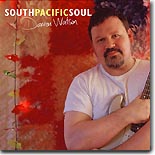 From
way on the other side of the world comes a strong CD, South Pacific
Soul (Red Rocks Records), the second solo release from New Zealand's
Darren Watson. This disc is a real mixed bag with most of
the music being blues- and soul-based. It starts out strongly with a
folkie soul number, "That's All There Is (Take My Hand)," featuring a
nice bluesy guitar solo from Watson. The slow, churchy "This Fool's
Advice" continues in the same vein, inviting comparisons to the music of
Otis Redding, which is dangerous territory for any singer. Watson is no
Redding, but he's still got an entertaining groove going.
From
way on the other side of the world comes a strong CD, South Pacific
Soul (Red Rocks Records), the second solo release from New Zealand's
Darren Watson. This disc is a real mixed bag with most of
the music being blues- and soul-based. It starts out strongly with a
folkie soul number, "That's All There Is (Take My Hand)," featuring a
nice bluesy guitar solo from Watson. The slow, churchy "This Fool's
Advice" continues in the same vein, inviting comparisons to the music of
Otis Redding, which is dangerous territory for any singer. Watson is no
Redding, but he's still got an entertaining groove going.
Watson next launches into the bluesiest thing on the CD, the shuffling
rhythm of "All Going Wrong"; it's a catchy tune. Later in the CD, the
material starts to resemble Elvis Costello's more soulful material;
Watson's vocals are more suited to this stuff. Really, the highlight of
the CD and one of the catchiest tunes I've heard all year is the upbeat
"Another Lonely Person." I was compelled to hit the repeat button on my
CD player to hear this one again and again. Yeah, it's a bit more pop
sounding, but it's a good song, and Alan Norman's accordion playing is a
very nice touch.
"Such Sweet Lies" sounds a little like 'Elvis Costello meets Z.Z. Top'
with heavy slide guitar accompaniment fueling this urgent lover's lament
with some creative imagery --- "... I'm working way to my first ulcer,
just swallowing this napalm that's killing my friends, 30 or 40 tubes a
day, just working my way to a cigarette end...each morning after, it's
one true disaster, but all that she thought was that he told such sweet
lies."
South Pacific Soul ends after just 10 songs, so the listener just
gets a taste of Darren Watson. It's worth searching out ... check
www.darrenwatson.com.
--- Bill Mitchell
Duke Robillard's live shows throughout his career have been all
over the map, with some great ones and then some not so good
performances. I kind of feel the same way about his latest CD, Guitar
Groove-A-Rama (Stony Plain Records). Duke says in the liner notes
that he wanted to "... make an album of tunes that showcased all the
sounds and influences that make up my style, or styles ..." That's just
the problem --- there are way too many things going on here to make this
a cohesive album.
When Robillard's good he's very good, like on the Ray Charles cover
"I'll Do Anything But Work" and the Chicago blues "No Way Out." But
"Blues A Rama," which Robillard uses to introduce the licks of every
guitarist that influenced him, is a good concept and probably works in a
live setting, but goes on way too long.
"This Dream" is another number that has too much happening and seemingly
never ends --- it's more of a bad dream. There's a very interesting
instrumental version of "Danny Boy," which starts as a slow jazzy number
before shifting into a higher gear for a funky ending. But even this one
goes on a little longer than it should have.
The upbeat shuffle, "Cookin," is a strong instrumental that keeps a good
groove going throughout and demonstrates Robillard's guitar prowess as
well as anything on the disc; he really is one of the best
players of this era and he shows it on this number.
Guitar Groove-A-Rama is not the definitive Duke Robillard CD, but
has its moments --- pick your favorites, load them to your mp3 player,
and away you go.
--- Bill Mitchell